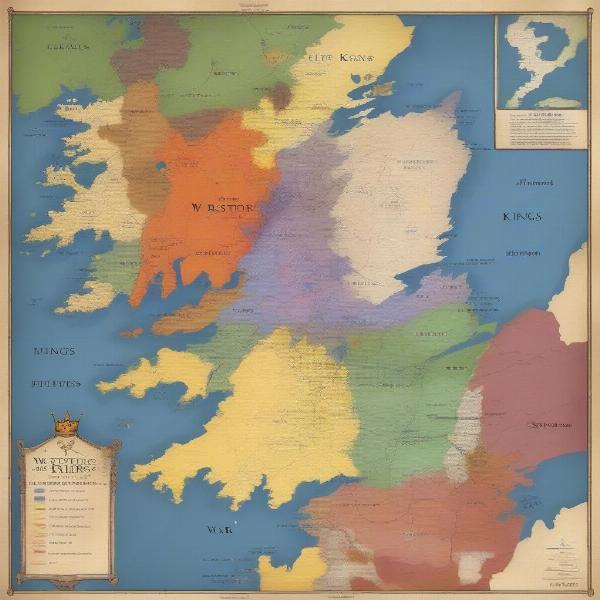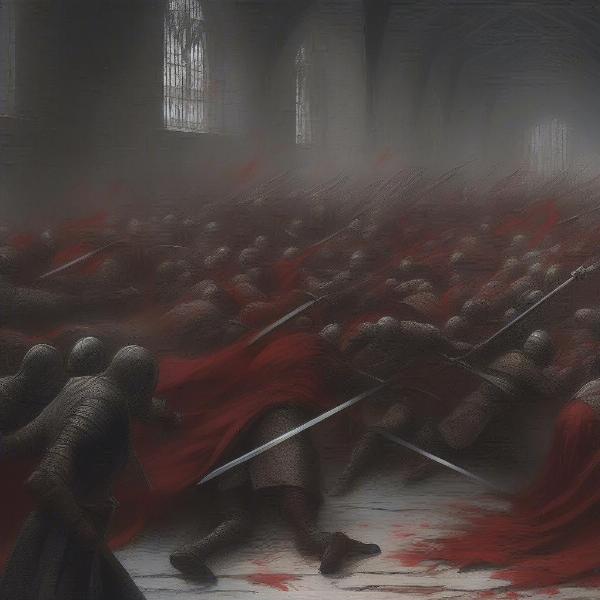The War of the Five Kings, a pivotal period in the Game of Thrones saga, was a complex and brutal conflict for the Iron Throne. This devastating war, fueled by ambition, betrayal, and long-standing rivalries, ripped Westeros apart and dramatically reshaped the political landscape. We’ll delve into the key players, their motivations, the major battles, and the lasting consequences of this bloody struggle for power.
The Contenders for the Iron Throne: Who Were the Five Kings?
The death of King Robert Baratheon ignited a furious scramble for power, leading to five different claimants declaring themselves king. Each contender had their own claim to the throne, supported by different houses and armies. Let’s break down the five kings:
- Joffrey Baratheon: As Robert’s “son” and heir apparent, Joffrey inherited the Iron Throne, though his legitimacy was questioned due to his true parentage being incestuous. He was backed by the powerful House Lannister.
- Stannis Baratheon: Robert’s younger brother, Stannis, believed he held the rightful claim to the throne as the true heir according to the laws of succession. He was supported by the devout followers of the Lord of Light.
- Renly Baratheon: Robert’s youngest brother, Renly, challenged both Joffrey and Stannis, believing his charisma and popularity made him a better ruler. He garnered the support of the powerful House Tyrell.
- Robb Stark: Declared King in the North after his father, Eddard Stark, was executed by Joffrey. Robb aimed to avenge his father and secure independence for the North.
- Balon Greyjoy: The Lord of the Iron Islands, Balon Greyjoy, saw the war as an opportunity to revive his kingdom’s old ambition of independence and dominion over the seas.
Key Battles and Strategic Maneuvers in the War of the Five Kings
The War of the Five Kings was defined by a series of significant battles and strategic maneuvers that shifted the balance of power. These clashes not only determined the fate of individual kings but also reshaped the political alliances and geography of Westeros. Some crucial battles include:
- The Battle of the Green Fork: Robb Stark’s cunning strategy allowed him to defeat Tywin Lannister’s forces, diverting attention while he marched south.
- The Battle of Blackwater: Stannis Baratheon’s naval assault on King’s Landing was thwarted by Tyrion Lannister’s wildfire strategy, a crucial turning point in the war.
- The Battle of the Whispering Wood: Robb Stark captured Jaime Lannister, a significant blow to the Lannister forces and a major victory for the North.
How Did the War of the Five Kings Change Westeros?
The War of the Five Kings profoundly impacted Westeros, leading to significant political and social changes. The war weakened many of the great houses, opening up opportunities for new players to emerge. It also fueled deep-seated resentment and mistrust, setting the stage for future conflicts.
 Westeros Map During War of the Five Kings
Westeros Map During War of the Five Kings
The Role of Betrayal and Shifting Alliances
Betrayal and shifting alliances played a significant role in shaping the outcome of the war. Marriages were forged and broken, oaths were sworn and discarded, and families were torn apart by conflicting loyalties. The Red Wedding, a particularly brutal example of treachery, decimated the Stark forces and dramatically altered the course of the war.
The Red Wedding: A Turning Point in the War
The Red Wedding, orchestrated by Walder Frey and Roose Bolton, was a massacre that saw the deaths of Robb Stark, his mother Catelyn, and many of their bannermen. This act of betrayal not only eliminated a major contender for the throne but also instilled a deep sense of fear and mistrust throughout Westeros.
 The Red Wedding Massacre Scene Depiction
The Red Wedding Massacre Scene Depiction
The Aftermath and Lasting Impact on the Game of Thrones
While the War of the Five Kings officially ended with the death of Balon Greyjoy, its effects continued to reverberate throughout Westeros. The war paved the way for the rise of new power players, intensified existing rivalries, and created a climate of instability that would continue to shape the political landscape for years to come.
The Rise of Tywin Lannister as the True Power Behind the Throne
In the wake of the War of the Five Kings, Tywin Lannister emerged as the true power behind the Iron Throne. His ruthless pragmatism and political maneuvering allowed him to consolidate power and secure the Lannister’s position as the dominant force in Westeros. However, his reign was short-lived, as he was ultimately killed by his own son, Tyrion.
 Tywin Lannister on the Iron Throne
Tywin Lannister on the Iron Throne
Conclusion: The War of the Five Kings: A Legacy of Blood and Betrayal
The Game Of Thrones War Of The Five Kings was a complex and brutal conflict that left an indelible mark on Westeros. Fueled by ambition, betrayal, and a relentless pursuit of power, this war reshaped the political landscape, decimated powerful houses, and set the stage for even greater conflicts to come. It remains a stark reminder of the cost of ambition and the fragility of power in the game of thrones. What are your thoughts on the lasting consequences of the War of the Five Kings? Share your insights in the comments below!
FAQ: Frequently Asked Questions about the War of the Five Kings
- Who started the War of the Five Kings? The conflict was triggered by the death of King Robert Baratheon and the subsequent power struggle for the Iron Throne.
- Why was it called the War of the Five Kings? Five individuals claimed the Iron Throne: Joffrey Baratheon, Stannis Baratheon, Renly Baratheon, Robb Stark, and Balon Greyjoy.
- Who ultimately won the War of the Five Kings? While Joffrey remained on the Iron Throne, the true victor was arguably Tywin Lannister, who consolidated power in the aftermath.
- What was the most significant battle of the war? The Battle of Blackwater was a pivotal turning point, preventing Stannis Baratheon from taking King’s Landing.
- What was the Red Wedding? The Red Wedding was a massacre orchestrated by Walder Frey and Roose Bolton, resulting in the deaths of Robb Stark, Catelyn Stark, and many of their bannermen.
- How did the War of the Five Kings impact Westeros? The war weakened major houses, fostered mistrust, and created instability that would continue to influence future events.
- What is the legacy of the War of the Five Kings? The war serves as a brutal reminder of the cost of ambition and the cyclical nature of violence in the pursuit of power.

